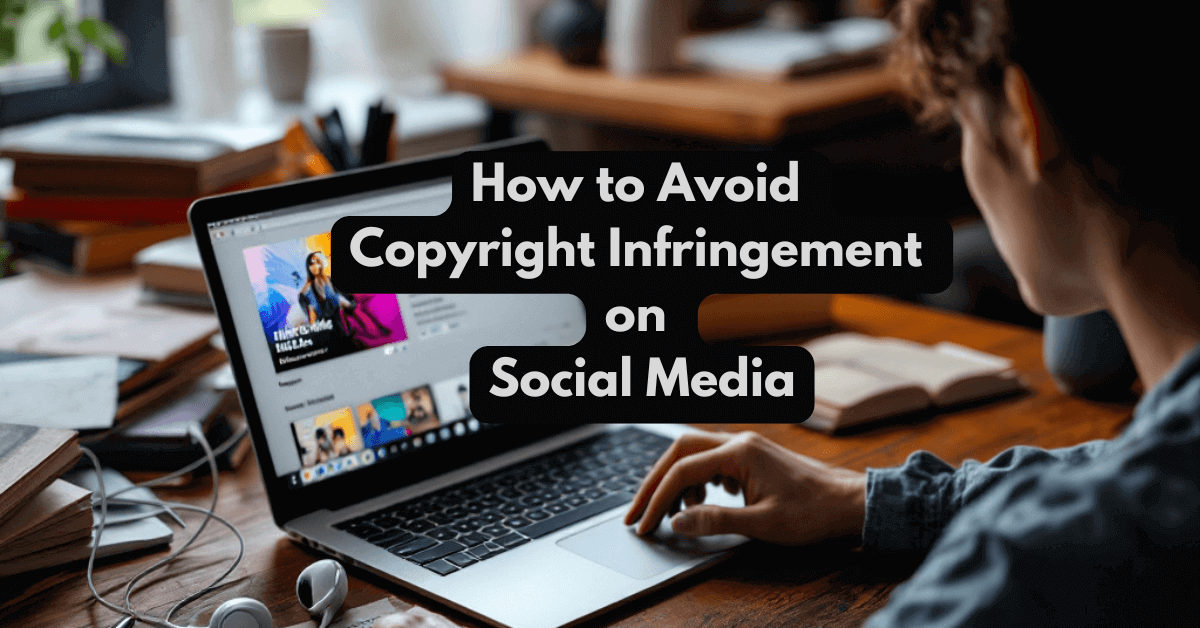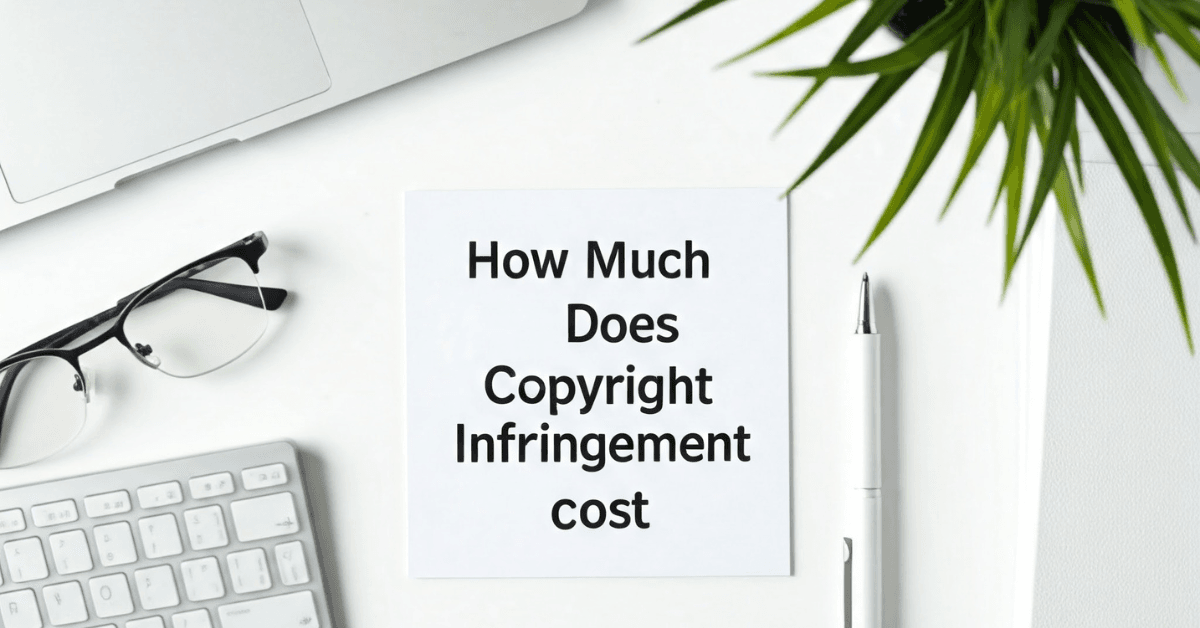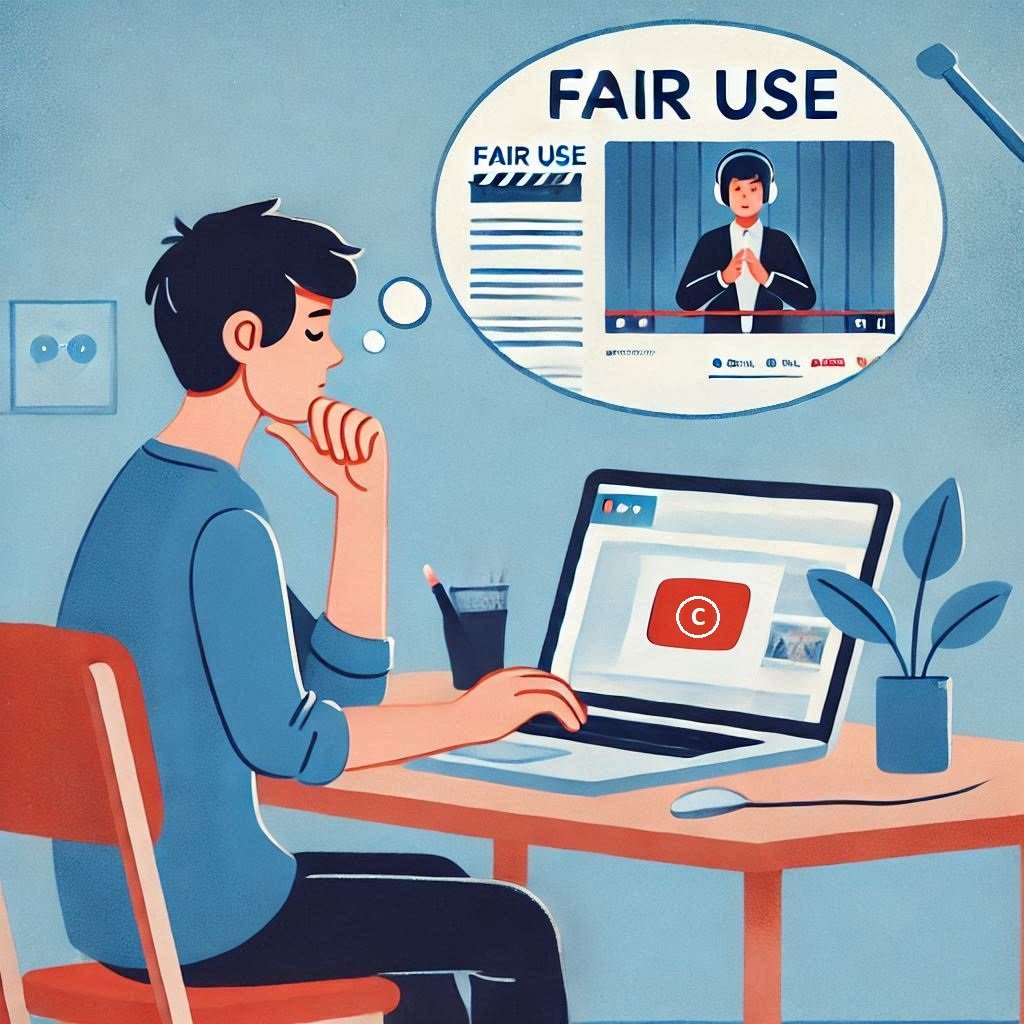Ever seen a cool photo online and wanted to share it with your friends on social media? Or maybe you found a funny video that you just had to show everyone? We all do it. But before you hit that “share” button, let’s make sure we’re not breaking any rules. Today, we’re talking about how to avoid copyright infringement on social media.
What is Copyright and How Does It Protect Your Creative Work?
Copyright is like a special shield (protection) for creative work. Imagine you’ve written a book, drawn a picture, made a song, or even created a cool video. Copyright protects these creations.
Here’s what it does:
Ownership: It gives you ownership over your work. This means you decide who can use it.
Protection: It stops others from using your work without your permission. If someone wants to use it, they need to ask you.
Recognition: It ensures that you get the credit for your creation.
So, in simple terms, copyright is all about giving creators the right to control and protect their work.
What is Copyright Infringement?
Imagine you’ve written and recorded a song you’re really proud of. But then, you discover people are sharing it online for free without asking you. That’s copyright infringement—when someone uses your work without permission.
Let’s understand this term with the help of Copyright infringement case.
In A&M Records, Inc. v. Napster, Inc. (2001), Napster—a platform that allowed users to share music for free—was sued by record labels for enabling copyright violations. The court ruled against Napster because:
- Songs weren’t transformed; they were just copied.
- Free sharing hurt music sales.
- Music is highly creative and protected under copyright.
- The platform disrupted the industry’s business model.
This case set the tone for how copyright laws are enforced in the digital age—even more relevant now with social media’s instant sharing culture.
What Constitutes Copyright Infringement?
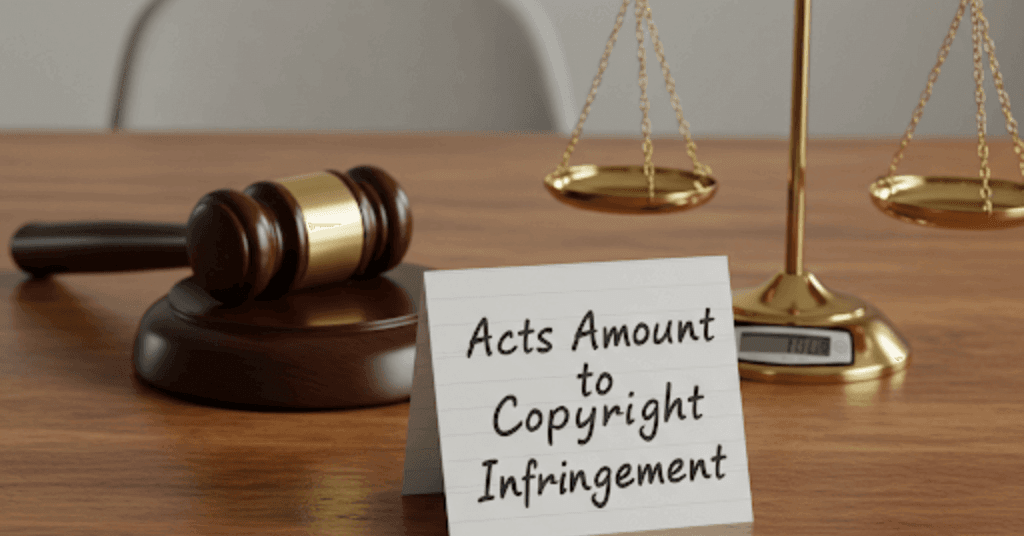
Copyright infringement happens when you use someone else’s work without their permission. It breaks the exclusive rights that copyright laws give to the creator.
Here are some common acts that amount to copyright infringement:
Copying and sharing: Making copies of music, movies, books, or other content and sharing them without permission.
Making spin-offs: Creating new versions, adaptations, or reimaginings of someone else’s work without their consent.
Public showings: Showing a movie, playing a song, or displaying artwork in public without permission.
Selling or licensing: Selling or giving permission to use someone else’s work without their permissio.
Downloading pirated content: Getting content like music, movies, or software from unauthorized sources.
Copyright laws exist to protect creators. They ensure people get the credit and rewards they deserve for their work.
Can You Ever Use Copyrighted Material Without Permission?
Yes, but only under specific circumstances—thanks to the doctrine of fair use. This rule allows limited use of copyrighted work without permission for purposes such as:
- Education: For teaching or research.
- Criticism: Offering reviews or commentary.
- News Reporting: Sharing facts or analysis.
- Parody: Adding humor by reimagining the original.
Fair use isn’t a free pass, though. Your use must transform the original work by adding value or new meaning.
Examples of Social Media Copyright Infringement Cases

Examples of social media copyright infringement cases show what can happen when people use content without permission. These stories can help you learn how to avoid copyright infringement on social media and protect yourself from trouble. Want to know how to avoid copyright issues? Keep reading:
1. Campbell v. Acuff-Rose Music, Inc. (1994) – USA
- Issue: Was a parody of a copyrighted song fair use?
- Court’s Decision: The court said that parody can be fair use. If the new work changes the original in a meaningful way, it might be allowed. Parodies or criticism can be fair use if they add social or cultural value.
- Takeaway: To avoid copyright infringement, a new work must not just copy the original. It needs to use the original in a way that gives it a new meaning or a new purpose.
2. Sony Corp. of America v. Universal City Studios, Inc. (1984) – USA
- Issue: Is recording TV shows with a VCR copyright infringement?
- Court’s Decision: The court ruled that recording shows for personal use is fair use. It’s okay to make a copy as long as it doesn’t harm the original work’s market.
- Takeaway: Personal use, like recording for later viewing, is generally okay if it doesn’t affect the original work’s value.
3. India TV Independent News Service Pvt. Ltd. v. Yashraj Films Pvt. Ltd. (2012) – India
- Issue: Whether India TV’s use of copyrighted songs in their news broadcasts constituted copyright infringement?
- Court’s Decision: The Delhi High Court ruled that using a small portion of a copyrighted song in a news program is not copyright infringement if it’s used for news reporting or commentary and doesn’t harm the original work’s market. This is known as “fair use” and is allowed under Indian copyright law.
- Takeaway: When using copyrighted content in news, use only what’s necessary and make sure it has a public purpose.
4. Authors Guild v. Google, Inc. (2015) – USA
- Issue: Does scanning books for Google Books violate copyright?
- Court’s Decision: The court said Google’s purpose was transformative because it created a searchable database. The small parts (snippets) shown didn’t replace the original books.
- Takeaway: To avoid copyright infringement, ensure your use of copyrighted work serves a new purpose and doesn’t compete with the original.
5. Ashdown v. Telegraph Group Ltd. (2001) – UK
- Issue: Whether the publication of verbatim extracts from a confidential meeting record by the Sunday Telegraph constituted a breach of copyright and confidence?
- Court’s Decision: The court determined that the Telegraph Group’s use of the verbatim extracts did not fall within any of the specific fair dealing exceptions outlined in the Copyright, Designs and Patents Act 1988.
- Takeaway: Only use copyrighted material if it serves the public interest, not just for profit.
By understanding these cases, you can avoid copyright infringement on social media. Always be mindful of how you use others’ work.
Uh Oh! Did My Funny Cat Video Violate Copyright Rules?
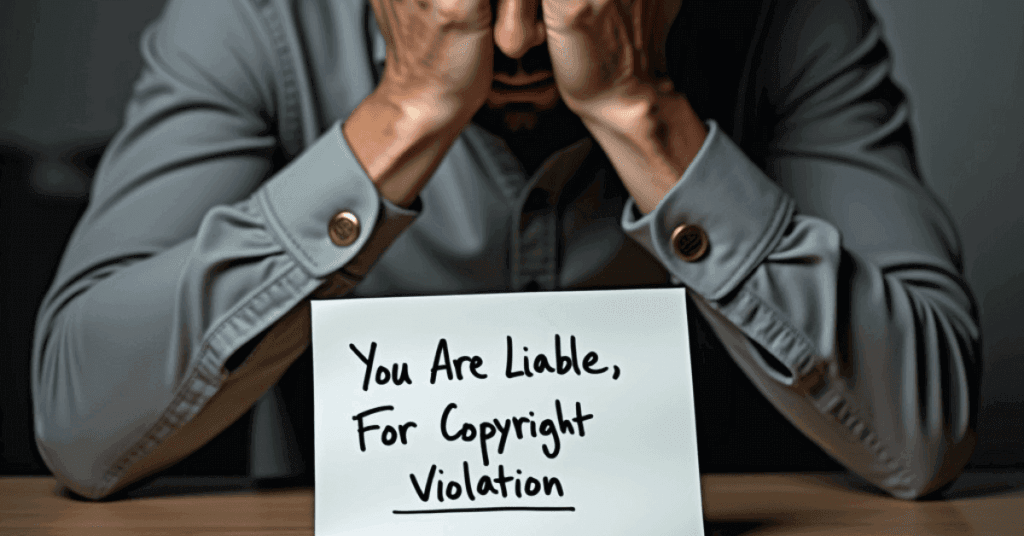
Social media is a great way to share funny cat videos, heartwarming stories, and interesting articles you find online. But have you ever stopped to think, “Could this be copyright infringement?”
Maybe you retweeted a hilarious meme without realizing it used a copyrighted image. Or perhaps you shared a news story without considering the copyright on the text. It happens to the best of us! This is where the concept of innocent infringement comes in.
Innocent Until Proven Guilty….. of Copyright Infringement?
Imagine this: You find a fantastic recipe online and post it on your social media for your friends to try. Sounds harmless, right? Well, legally, it could be copyright infringement if the recipe wasn’t originally published with permission to share.
This might seem unfair, but copyright law protects the creative expression of authors and artists. That recipe? It might be someone’s livelihood. But there’s a twist! Copyright law also considers something called “innocent infringement.”
Who is an Innocent Infringer?
An innocent infringer is someone who unknowingly infringes on a copyright. This could be because they:
- Didn’t know the material was copyrighted.
- Didn’t know they needed permission to use it.
- Relied on misleading information about the copyright status.
Court Case Example: The Case of the Confused Tweeter
Let’s look at a real-life example. In the case of Bridgeport Music, Inc. v. Dimension Films, the dispute arose over the use of a drum beat from a copyrighted song in the film “The Wedding Singer.” The filmmakers (Dimension Films) argued that the use of the drum beat was “de minimis,” meaning it was so insignificant that it should not be considered infringement.
The song’s owner (Bridgeport Music) sued them for copyright infringement. The court ruled that even a very small part of a song is protected by copyright law, so the movie company was wrong.
This case made it clear that you need permission to use any part of someone else’s song, no matter how small.
How to Avoid the Innocent Infringer Trap
So, how can you avoid this situation altogether? Here are some tips:
- Be cautious about sharing content you didn’t create. If you’re unsure, err on the side of caution and find something else to share.
- Always check the source. Look for copyright notices or information about sharing permissions.
- Give credit where credit is due. If you’re sharing someone else’s work, properly attribute it to them.
- When in doubt, leave it out! There’s plenty of awesome content online that is clearly marked for sharing.
Whoa! A Copyright Takedown Notice?
So, you’ve received a copyright takedown notice. That dreaded message that pops up on your social media or streaming platform. Don’t worry, it’s not the end of the world! While it might feel like you’re in trouble, understanding the process can help you navigate this tricky situation.
What Does This Notice Even Mean?
Basically, it means someone believes you’ve used their copyrighted material without permission. This could be anything from a song in your video to a photo you used in your blog post.
Now What?
First things first: Read the notice carefully. Pay attention to the specific content being challenged and the copyright owner’s claims. They might even provide instructions on how to remove the content.
Do I Have to Take it Down?
Not always. If you believe the notice is inaccurate or if your use of the material falls under fair use (a legal doctrine that allows for limited use of copyrighted material without permission), you can file a counter-notification.
However, it is always good to remove the content shows you are acting in good faith and trying to comply with the notice. This can help reduce potential damages or penalties if you know that the content you shared was without permission.
What’s a Counter-Notification?
Think of it as a formal “I disagree!” letter. It’s a way to dispute the copyright owner’s claims. However, be prepared for potential consequences. If your counter-notification is incorrect, you could face legal action.
When Should I Call a Lawyer?
If the situation is confusing, or if the stakes are high, it’s always a good idea to consult with a lawyer who specializes in copyright law. They can help you understand your rights and options.
Remember: Copyright law can be tricky, and every situation is different. By understanding the process and taking the right steps, you can handle copyright takedown notices with confidence.
How to Avoid Copyright Infringement on Social Media: 7 Simple Tips

Social media platforms are a great way to share ideas, creativity, and content. However, many users unknowingly use copyrighted materials, which can lead to legal issues. Whether you’re posting on Facebook, uploading a video on YouTube, or sharing content as a student, understanding how to avoid copyright infringement is essential. Here are 7 simple tips to help you avoid copyright issues on social media.
1. Transform the Work
Many of you might have wondered how to avoid copyright infringement on YouTube, especially when you want to use someone else’s content in your video.
You may hesitate and think, “Will this make my video subject to a copyright violation?” The simple tip is to make it your own. If you’re adding something new to the work, such as a new meaning or message, it could be considered fair use.
This might involve creating a parody or providing commentary that alters the original content. The key is that your new creation should add value—transforming the original work, rather than merely copying it.
2. Use for Educational or News Purposes
Sometimes, you can use copyrighted works for teaching, research, or news reporting. But it’s important to know that your use should be necessary and limited.
For instance, sharing small portions of content to discuss a current event or for educational purposes might not be considered infringement if it’s done correctly. Just remember—always keep it relevant and brief.
3. Limit Your Use to What’s Needed
One common tip to avoid copyright infringement on social media is to use only what you need. If you’re sharing a video clip or an image, make sure you aren’t using more than necessary.
The less you use, the better. Whether it’s for commentary or reporting, sticking to the essentials can help keep you out of legal trouble.
4. Seek Permission
While it’s tempting to just grab a piece of content from the internet, getting permission is often the safest route.
If you want to use someone else’s work, reach out to them for approval. It’s that simple. This avoids any confusion and helps you build good relationships with content creators.
5. Give Credit Where It’s Due
Even if you have permission or are using content in a way that’s considered fair use, always give credit to the original creator.
A simple mention of their name or a link back to their original work can go a long way in protecting you from potential copyright issues.
6. Don’t Compete with the Original Work
It’s important not to replace the original work with your use. For example, if your post or video could be seen as a substitute for the original work (like sharing the entire movie or album), this could lead to a copyright violation.
The more you compete with the market of the original work, the higher the risk of infringement.
7. Stay Clear of Commercial Use Without Permission
Using content for commercial purposes (like promoting your business or selling products) without permission is a big no-no.
If you’re wondering how to avoid copyright infringement on Facebook, remember that even reposting content for commercial use, such as making money, may not fall under fair use. Always ensure you have the proper permissions if you plan to use content for commercial purposes.
Ignoring Copyright Infringement? Think Again!
You might be thinking, “Who cares about copyright? It’s just a piece of paper, right?” Wrong!
Copyright infringement isn’t just a minor mistake—it comes with serious consequences. Let’s understand how:
What Happens If You Infringe on Copyright?
If you use someone else’s copyrighted work without permission, you’re on the hook for one of two things:
Actual Damages and Profits:
- The copyright owner can claim the financial loss they suffered because of your infringement.
- On top of that, they can take any profits you made from their work. And here’s the catch—they only need to show your gross revenue. It’s up to you to prove how much of that money isn’t tied to the infringement.
Statutory Damages: (According to 17 U.S. Code § 504 of the U.S. Copyright Law)
- Instead of actual losses, the copyright owner can ask the court to decide on damages.
- This can range from $750 to $30,000.
- If you knowingly broke the rules (called willful infringement), this amount can shoot up to $150,000!
- But if you prove you didn’t realize you were infringing, the court might reduce the damages to as low as $200.
Is Ignorance an Excuse?
Not really, but there are a few exceptions:
- If you thought your use was fair (like for educational purposes), you might avoid damages altogether.
- Nonprofit schools and public broadcasters also get some extra protection under specific conditions.
Willful Infringement = Big Trouble
If you knowingly violate copyright laws, the penalties get harsher. For example:
- Using fake contact info for a domain name? The law presumes you did it on purpose, and the penalties reflect that.
Special Cases = Bigger Penalties
If a business falsely claims it’s exempt from copyright rules, they might owe additional damages.
Always Remember
Ignoring copyright laws or thinking “it’s no big deal” can cost you—big time. Whether it’s paying for someone else’s losses, losing your own profits, or facing massive court-ordered penalties, it’s not worth the risk.
Always respect copyright and avoid the headache. If you’re ever unsure, consulting with a legal expert is the smartest move.
Conclusion
Knowing how to avoid copyright infringement on social media is essential for staying legally safe and maintaining your online reputation. Whether you’re a business owner, content creator, or student, following these tips can help you navigate copyright laws effectively. Remember, staying informed and respecting creators’ rights are key to a positive social media experience.
Disclaimer: The information provided is for general informational purposes only. The content is based on my own research and knowledge of the subject matter. For your specific situation, please consult an Intellectual Property Lawyer. This post does not create an attorney-client relationship

